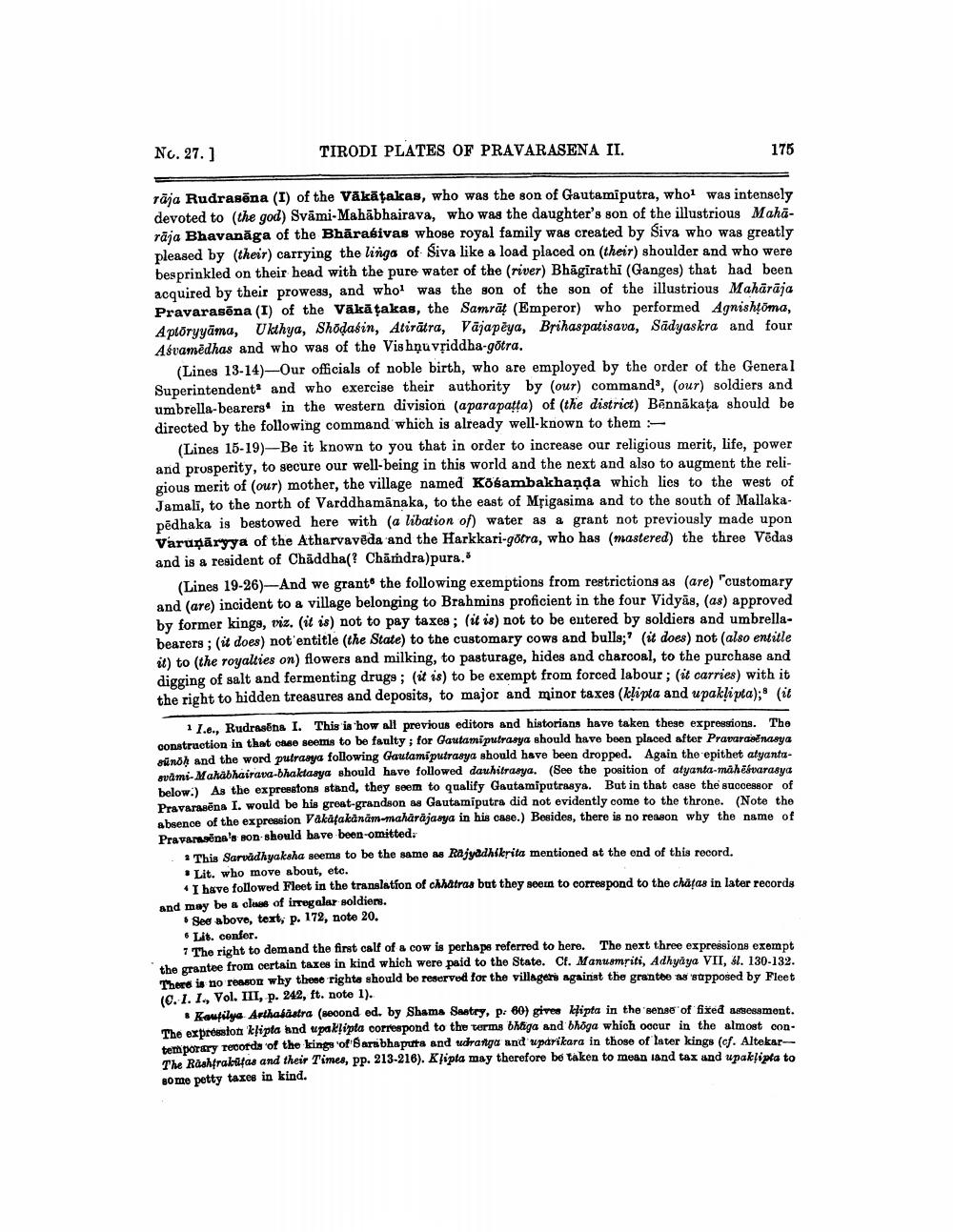________________
No. 27.]
TIRODI PLATES OF PRAVARASENA II.
175
tāja Rudrasēna (I) of the Vākāțakas, who was the son of Gautamiputra, who was intensely devoted to the god) Svāmi-Mahābhairava, who was the daughter's son of the illustrious Maharāja Bhavanāga of the Bhārasivas whose royal family was created by Siva who was greatly pleased by their) carrying the linga of Siva like a load placed on (their) shoulder and who were besprinkled on their head with the pure water of the (river) Bhāgirathi (Ganges) that had been acquired by their prowess, and whol was the son of the son of the illustrious Mahārāja Pravarasēna (I) of the Vākā takas, the Samrāt (Emperor) who performed Agnishtöma, Aptoryyāma, Ukthya, Shodasin, Atirätra, Vājapèya, Brihaspatisava, Sadyaskra and four Asvamëdhas and who was of the Vishnu vriddha-gotra.
(Lines 13-14)-Our officials of noble birth, who are employed by the order of the General Superintendent and who exercise their authority by (our) command, (our) soldiers and umbrella-bearers in the western division (aparapatta) of the district) Bënnäkața should be directed by the following command which is already well-known to them
(Lines 15-19)-Be it known to you that in order to increase our religious merit, life, power and prosperity, to secure our well-being in this world and the next and also to augment the religious merit of (our) mother, the village named Köśambakhanda which lies to the west of Jamali, to the north of Varddhamanaka, to the east of Mrigasima and to the south of Mallakapēdhaka is bestowed here with (a libation of water as a grant not previously made upon Varuņāryya of the Atharvavēda and the Harkkari-götra, who has (mastered) the three Vēdas and is a resident of Chäddha(? Chāṁdra)pura.
(Lines 19-26)-And we granto the following exemptions from restrictions as (are) "customary and (are) incident to a village belonging to Brahmins proficient in the four Vidyās, (as) approved by former kings, riz. (it is) not to pay taxes; (it is) not to be entered by soldiers and umbrellabearers; (it does) not'entitle (the State) to the customary cows and bulls;' (it does) not (also entitle it) to (the royalties on) flowers and milking, to pasturage, hides and charcoal, to the purchase and digging of salt and fermenting drugs; (it is) to be exempt from forced labour; (it carries) with it the right to hidden treasures and deposits, to major and minor taxes (klipta and upaklipta); (it
11.e., Rudras na I. This is how all previous editors and historians have taken these expressions. The construction in that one seems to be faulty; for Gautamiputrasya should have been placed aftor Pravarantasya sinoh and the word putranya following Gautamiputrasya should have been dropped. Again the epithet atyantasvami-Mahabhairava-bhaktasya should have followed dauhitrasya. (See the position of atyanta-mahestarasya below.) As the expressions stand, they seem to qualify Gautamiputrasya. But in that case the successor of Pravarasēna I. would be his great-grandson as Gautamiputra did not evidently come to the throne. (Note the absence of the expression Vakafakānām-maharajasya in his case.) Besides, there is no reason why the name of Pravansna's son should bave been omitted:
This Sarvidhyaksha seems to be the same as Rajyadhikrita mentioned at the end of this record. • Lit. who move about, etc.
I have followed Fleet in the translation of chhatras but they seem to correspond to the charas in later records and may be a class of irregalar soldiers.
See above, text, p. 172, note 20. . Lit. cenfer.
7 The right to demand the first calf of a cow is perhaps referred to here. The next three expressions exempt the grantee from certain taxes in kind which were paid to the State. Cf. Manusmriti, Adhyâya VII, . 130-132. There is no reason why these rights should be reserved for the villagers against the grante as supposed by Fleet (0.1. I., Vol. III, p. 242, ft. note 1).
• Kutilya Arthajästra (second ed. by Shama Sastry, P: 60) gives klipta in the sense of fixed assessment. The expresastot klipta and spakjupta correspond to the worms bhaga and bhoga which occur in the almost contemporary records of the kings of Barsbhaputs and sudranga and uparikara in those of later kings (cf. AltekarThe Rashtraktas and their Times, pp. 213-216). Klipta may therefore be taken to mean land tax and upallipta to 80 me petty taxes in kind.




